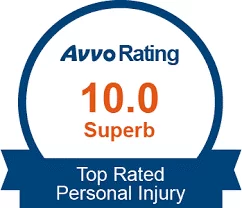When you experience a serious vehicle crash, it may feel like time stands still. In reality, the clock keeps ticking, and every minute counts. The first 24 hours after an injury accident are typically the most critical, and that’s even more so when it comes to a child’s injuries. What you do (and don’t do) in these moments can have a profound impact. Let’s kick off our discussion by talking about what steps to take in the vital moments after a car crash. (Note that this scenario assumes your child has sustained significant injuries, so we’ll be discussing how to best address that situation. For more minor incidents, a different course of action may be better.)
Get Safe / Get Emergency Medical Assistance
Obviously, the very first order of priority is to be safe. In every sense of the word.
That means that there are a few immediate things to take care of, but the exact order may depend on the situation you’re involved in. You need to get to a safe place (e.g., away from traffic). However, depending on the nature of injury, moving a someone who is severely injured can cause additional injury (e.g., if someone has sustained a spinal injury). On the other hand, if there’s an imminent danger (e.g., a car fire), that may supersede the concern for increasing an injury.
Of course, as soon as possible, call 911 for relevant emergency services, and—depending on other conditions—911 might be able to advise you if it’s safe to move someone out of a disabled (but otherwise not dangerous) vehicle.
You’re going to have to make a judgment call in terms of which of these things need to be done in which sequence. But there’s one thing to remember: You may be focused on the needs of your child, but make sure that everyone involved in the accident is seen by a medical professional. That includes you.
Gathering Evidence
Once everyone is safe and has had the necessary medical treatment, the next most important priority is to start documenting everything, from the moment the crash occurs.
At this point, everything is potential evidence for your case. Your first point of concern is your child’s welfare, and that’s understandable, but realize that someone needs to gather evidence at the accident scene—whether it’s you or someone else.
If you’re too injured yourself, or if you need to tend to your child, assign someone else start documenting. Consider calling a family member, friend or attorney to come assist with the scene.
Camera phones are modern-day miracles when it comes to accident scenes. Start capturing extensive photos and/or video of the following:
- Injuries to your child, yourself and others
- Damage to the vehicle(s) and any other property (dented street signs or barricades, broken trees or landscaping)
- Photos of other party’s driver’s license and insurance, if you can get it
- Position of all vehicles involved in the crash
- Skid marks, if any
- Street signs or other location reference points.
Talking to the Other Driver
When talking to the other driver involved in the crash, be cordial but say as little as possible. Ask for the driver’s insurance information and a photo of his license, and share your info with him, if requested.
Talking to Police and Witnesses
If any witnesses observed the crash, get their contact information. If possible, try to document their version of what happened using audio or video recording apps on your phone. (The police will gather this information, also, but it doesn’t hurt to have a duplicate version.) When the police arrive, tell them your story for their accident report, and ask for a copy of the report for your records.
What NOT to Do or Say
Finally, in these critical moments, there are certain things you should avoid saying and/or doing:
- DO NOT get into an altercation with the other driver. No matter how angry and hurt you are, you could only make the situation worse with an argument of any sort.
- DO NOT admit guilt, even if you feel you were somehow at fault. The other driver is gathering evidence, too—so are the police—and you may not be as much to blame as you think. Just collect the information, and the evidence will speak for itself.
When your child has been seriously injured in an accident, you need skilled legal counsel to help fight for the compensation your child deserves. For a free consultation, call Greathouse Trial Law at (678) 310-2827.


